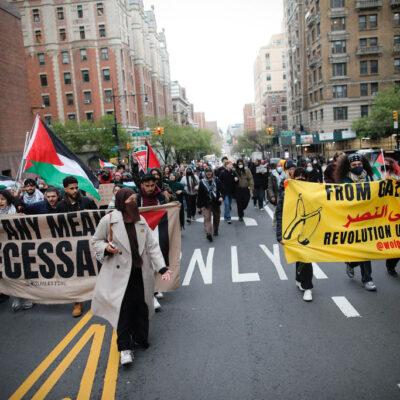Anti-Israel protests erupted during the Vuelta a España cycling race, causing significant disruptions and drawing widespread attention. Demonstrators gathered along key stages of the event to voice opposition to Israeli policies, turning the international sporting event into a flashpoint for political controversy. This unexpected intervention spotlighted the intersection of sports and geopolitics, raising questions about the impact of activism on global athletic competitions.
Anti-Israel Demonstrations Bring Vuelta a Espana to a Standstill
Thousands gathered along the race route as protesters voiced their condemnation of Israel’s recent actions, resulting in a complete halt to the competition for over an hour. The disruption took place in one of the most iconic stages of the multi-week event, forcing organizers to pause the race for the safety of both riders and demonstrators. Security forces struggled to maintain order amid the chaos, with some cyclists visibly unsettled by the unexpected standstill.
Key impacts of the demonstrations included:
- Delay of more than 60 minutes in race progression
- Heightened tension between protest groups and law enforcement
- Interruption of live broadcast coverage and race timing
- Calls from athletes and officials for peaceful protests in sporting venues
| Stage | Location | Delay Duration | Security Response |
|---|---|---|---|
| 15 | Valencia | 65 minutes | Increased police presence, barriers deployed |
| 16 | CastellĂłn | Not delayed | Heightened vigilance |
Impact on International Sporting Events and Diplomatic Repercussions
The recent disruptions at the Vuelta a España have cast a shadow over the event, underlining the potent intersection of sports and geopolitics. Anti-Israel protests not only interrupted the race but also sparked wider concerns regarding the security and neutrality of international sporting events hosted in politically sensitive regions. Organizers grappled with balancing the integrity of the competition while addressing the growing tensions among participating nations and spectators alike.
Diplomatically, the protests have intensified scrutiny from several governments and international bodies, resulting in detailed discussions about the implications for future events. Key diplomatic repercussions include:
- Increased diplomatic dialogues between affected countries to prevent sport-related conflicts.
- Heightened security protocols for multinational sporting gatherings.
- Calls for stricter regulations from international sports federations regarding political expressions during events.
| Repercussion | Stakeholders Involved | Potential Outcome |
|---|---|---|
| Diplomatic Tensions Rise | Governments, Embassies | Strained bilateral relations, negotiations |
| Security Enhancements | Event Organizers, Security Forces | Increased costs, tighter control measures |
| Regulatory Reforms | International Sports Federations, Athletes | Implementation of guidelines restricting political protests during events |
| Response | Impact | Effectiveness |
|---|---|---|
| Protester Liaison Teams | Reduced confrontations | High |
| Restricted Access Zones | Controlled protest movements | Moderate |
| Real-time Media Monitoring | Quick response to misinformation | Moderate |
In the midst of globally significant sporting events, the challenge of managing politically charged demonstrations grows increasingly complex. Organizers must balance the integrity of the competition with the right to peaceful protest, deploying proactive measures that prioritize safety without stifling expression. Key strategies include:
- Engagement with Stakeholders: Facilitating dialogue between protest leaders, sports authorities, and local law enforcement to establish agreed boundaries and communication channels.
- Enhanced Security Protocols: Deploying trained personnel adept at de-escalation techniques to minimize disruptions and prevent violence.
- Clear Communication: Providing timely and transparent information to athletes, fans, and media about potential risks and event adjustments.
Implementing these strategies requires meticulous coordination, often supported by data-driven risk assessments. The table below outlines typical responses and their impacts observed in recent international competitions:
| Response | Impact | Effectiveness |
|---|---|---|
| Protester Liaison Teams | Reduced confrontations | High |
| Restricted Access Zones | Controlled protest movements | Moderate |
| Real-time Media Monitoring | Quick response to misinformation | Moderate |
As the Vuelta a España continues to unfold, the recent anti-Israel protests have highlighted the increasingly complex intersection of international politics and global sporting events. Organizers and authorities face mounting pressure to balance security concerns with the spirit of competition, while athletes and fans navigate an environment marked by tension and division. The situation remains fluid, with further developments expected as protests continue to capture attention beyond the race itself.




